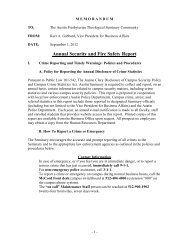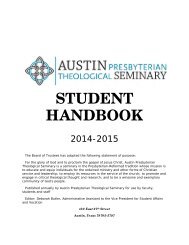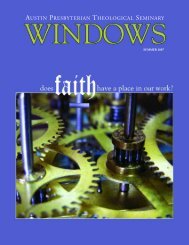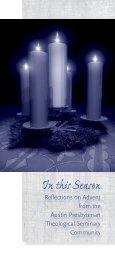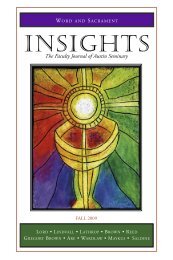Catalogue 2008 Book - Austin Presbyterian Theological Seminary
Catalogue 2008 Book - Austin Presbyterian Theological Seminary
Catalogue 2008 Book - Austin Presbyterian Theological Seminary
You also want an ePaper? Increase the reach of your titles
YUMPU automatically turns print PDFs into web optimized ePapers that Google loves.
THE THEOLOGICAL-HISTORICAL DEPARTMENT<br />
ELLEN L. BABINSKY, WHITNEY S. BODMAN, JAMES S. CURRIE,<br />
ISMAEL GARCÍA, WILLIAM N. A. GREENWAY, DAVID H. JENSEN,<br />
TIMOTHY D. LINCOLN, CYNTHIA L. RIGBY<br />
The courses in this department are designed to provide grounding in Christian theology,<br />
history, and ethics.<br />
The courses in theology emphasize basic issues in doctrines such as the Trinity, the<br />
person and work of Jesus Christ, human nature, law and gospel, and the authority of<br />
Scripture. These are considered through the thought of major theologians both past<br />
and present. Ethics courses address both fundamental matters and specifi c topics and<br />
thinkers. The courses encourage students to bring theological and ethical insights to bear<br />
upon contemporary moral and cultural issues and to integrate responsibly the various<br />
disciplines of seminary study.<br />
Courses in the history of the church acquaint students with its diverse expressions<br />
throughout the centuries and lead them to view the contemporary church against<br />
this historical background. This approach provides perspective on the challenges and<br />
opportunities that confront the church today. In addition, students investigate the<br />
origins and development of their own denominations so that they can fulfi ll informed<br />
and constructive roles in the lives of their churches.<br />
COURSE DESCRIPTIONS<br />
TH.100 INTRODUCTION TO THE HISTORY OF CHRISTIANITY: APOSTOLIC ERA TO<br />
1650<br />
This course surveys the development of Christianity from the earliest communities established<br />
by the apostles through the Reformation era. Attention is given to the critical turning points<br />
for Christianity in relation to the state, the practice of worship and piety, and institutional<br />
development. Six credits. Ms. Babinsky; Fall<br />
TH.104 SYSTEMATIC THEOLOGY I<br />
The fi rst in a two-course sequence, this course provides an historical, systematic, and<br />
constructive introduction to major themes and doctrines in the Christian tradition. It<br />
concentrates on classical expressions of Christian theology, how these expressions have been<br />
developed by some of the pivotal theologians of the church, and the ways in which this<br />
heritage is being critically and constructively appropriated and reshaped in the life of the<br />
church today. It aims to assist students in developing their capacities for theological analysis<br />
and refl ection. Ordinarily, John Calvin’s Institutes of the Christian Religion (1559) serves as a<br />
basic text. Six credits. Ms. Rigby; Fall<br />
TH.118 DEVELOPMENTS IN THE HISTORY OF MODERN CHRISTIANITY: 1650 TO<br />
THE PRESENT<br />
This course analyzes developments in Christianity from the dawn of the modern era to the<br />
present and explores issues such as Christianity and the Enlightenment, the emergence of the<br />
modern states, political and industrial revolutions, as well as the emergence of missionary and<br />
ecumenical movements. Particular attention is given to issues surrounding developments in<br />
Christianity in the United States as students develop their own topics for in-depth historical<br />
research. Six credits.<br />
TH.200 INTRODUCTION TO CHRISTIAN ETHICS<br />
The goals of this course are to acquaint the student with the language and concepts of<br />
philosophical and theological ethics, the main principles of ethics, and the models of ethical<br />
refl ection. Students consider the way ethics is used in analyzing issues, and/or the way ethics<br />
58



